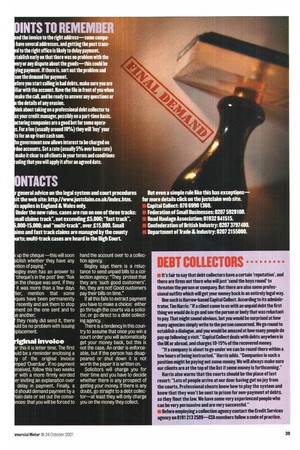up or else II
Page 38

Page 39

If you've noticed an error in this article please click here to report it so we can fix it.
Collecting debts can he a nightmare—particularly for small businesses. lipq nrimio has been taking a trawl through the advice on offer and picks some ideas for getting a difficult job done in the best way for your business.
How often have you been told "the cheque's in the post" only for the postman to mysteriously mislay that particular envelope? While most cliches have moved beyond parody, this one remains alive and well— chances are that it has been used to fob off several unhappy suppliers since you started reading this article.
Big or small, known to you or unknown, everyone in the haulage industry has come across firms that simply refuse to pay until they absolutely have to. However, there are some practical steps that you can take to speed up the process.
The first point to consider about debt collecting comes before you even undertake the work. One of the main questions you should be asking yourself when a freight forwarding com
pany offers you a backload from Athens, is: am I really going to be paid for this job?
While it can be tempting to fill an empty truck with the first load that comes along, if the payment fails to materialise it is worthless, and will actually end up costing you more than if you had come back empty.
Credit checks
Credit checks on a company are a good idea but should also be treated with caution—companies which have gone into liquidation have often passed such checks on the same day. Try to talk to another subcontractor. Assuming they have no connection, they will usually be happy to reveal how easily they have been paid in the past.
Once you have carried out suitable checks, your next move, according to debt expert John Begley, should to be to put in place a system for collecting any money that is owed to you.
Begley, who has written extensively on the subject, says firms which develop a "regular cash management process" will see fewer accounts become overdue.
"Bill your customers promptly," he says. "If you don't send an invoice until a few weeks after the goods have been delivered or service performed, can you wonder that your customer treats your bill with a similar lack of urgency? It is also more difficult for the customer to check the invoice, and he can feel justified in putting it aside until he has time. Bills promptly submitted are usually promptly paid."
He suggests the trick is to make it easy for your customer to pay. A detailed invoice with all the pertinent data is more likely to be handled quickly, just to get rid of it. Ask your customer what information he wants on the invoice— for example, delivery address if different from the office address;
job site number; order delivery date, and so on. things may be obvious, but I can add data that makes it e for the invoice to be proce you will find it gets through system and to the cheque-si hand that bit sooner.
Begley says a company s set clear terms—includin exact number of days in whi invoice must be paid—and sure that all the companie do business with under those terms. There is no roo ambiguity in this area, he w As soon as a cheque fai materialise, act on day one. put it off, or give them an day or two just to be 'nice' don't have to be unplea either; just consistent. B points out that a phone ca catch the slow payer off-g "Press for a specific day, n undefined 'next week', and sure you do call them on day," he adds. "Offer to go up the cheque —this will soon blish whether they have any ntion of paying."
gley even has an answer to 'cheque's in the post' line: "Ask n the cheque was sent. If they it was more than a few days her, mention that some ques have been permanently recently and ask them to stop ment on the one sent and to e another.
they really did send it, there uld be no problem with issuing placement.
iginal invoice
r this it is letter time. The first uld be a reminder enclosing a y of the original invoice mped 'Overdue'. If no payment eceived, follow this two weeks r with a more firmly worded er inviting an explanation over delay in payment. Finally, a d should demand payment by a am n date or set out the consenoes: that you will be forced to hand the account over to a collection agency.
Begley says there is a reluctance to send unpaid bills to a collection agency: "They protest that they are 'such good customers'. No, they are not! Good customers pay their bills on time."
If all this fails to extract payment you have to make a choice: either go through the courts via a solicitor, or go direct to a debt collecting agency.
There is a tendency in this country to assume that once you win a court order you will automatically get your money back, but this is not the case. An order is enforceable, but if the person has disappeared or shut down it is not worth the paper it is written on.
Solicitors will charge you for their time and you have to decide whether there is any prospect of getting your money. If there is any doubt, go straight to a debt collector—at least they will only charge you on the money they collect.












































































































































